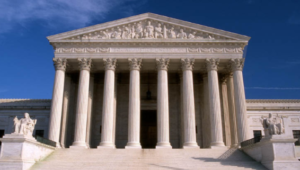The Supreme Court’s Landmark Decision
In a decision that has sent shockwaves across the political landscape, the Supreme Court has ruled that states cannot remove former President Donald Trump from election ballots, despite allegations of inciting the January 6th insurrection at the Capitol.

The Legal Battle Unfolds
Since the events of January 6th, there has been intense debate over Trump’s role in inciting the violent attack on the Capitol. Amid calls for accountability, several states sought to remove Trump’s name from future election ballots, citing the insurrection as grounds for disqualification.
Supreme Court Weighs In
In a closely watched case, the Supreme Court deliberated on the constitutionality of states’ efforts to bar Trump from appearing on election ballots. In a narrow 5-4 decision, the Court ruled in favor of Trump, asserting that states do not have the authority to impose additional qualifications for presidential candidates beyond those outlined in the Constitution.
Legal Arguments and Implications
The Court’s decision has sparked heated debate among legal scholars, politicians, and the public. Supporters of the ruling argue that it upholds the principles of free speech and due process, while critics contend that it sets a dangerous precedent by allowing individuals implicated in acts of sedition to seek the highest office in the land.
Reactions and Responses
The Supreme Court’s decision has elicited a range of reactions from across the political spectrum. Supporters of Trump hail the ruling as a victory for democracy and the rule of law, while opponents express dismay over what they see as a failure to hold accountable those responsible for the attack on the Capitol.
The Fallout Continues
In the aftermath of the Court’s decision, questions linger about the broader implications for accountability and the rule of law in the United States. Some fear that the ruling will embolden future would-be insurrectionists, while others worry about the erosion of democratic norms and institutions.
As the nation grapples with the fallout from the January 6th insurrection and its aftermath, the Supreme Court’s decision serves as a stark reminder of the complexities and challenges facing American democracy. The debate over Trump’s role in the events of that day is far from over, and the ramifications of the Court’s ruling are likely to reverberate for years to come.
A Landmark Decision with Far-Reaching Consequences
The Supreme Court’s ruling that states cannot remove Trump from election ballots in response to the insurrection represents a watershed moment in American jurisprudence. As the nation continues to reckon with the events of January 6th and their aftermath, the decision serves as a sobering reminder of the enduring tensions between democracy, accountability, and the rule of law.
1: Supreme Court Decision Shakes Political Landscape Ahead of Super Tuesday
In a landmark decision, the Supreme Court ruled that states lack the authority to disqualify former President Donald Trump from the ballot for his alleged role in the Jan. 6, 2021, attacks on the U.S. Capitol. This ruling, which comes just one day before Super Tuesday, is poised to have significant implications for the ongoing political landscape.
2: Legal Battle Unfolds Over Interpretation of 14th Amendment
The legal battle centered around the interpretation of Section 3 of the 14th Amendment, enacted in the aftermath of the Civil War to prevent individuals who supported the Confederacy from holding office. While some argued that Trump’s actions constituted insurrection and thus rendered him ineligible for office, the Supreme Court’s majority opinion emphasized that only Congress has the authority to enforce Section 3, not individual states.
3: Justices Divided Over Scope of Decision
The Supreme Court’s decision was not without dissent. While all nine justices agreed that Colorado could not remove Trump from the ballot, four justices expressed reservations about the broader implications of the ruling. Justices Sonia Sotomayor, Elena Kagan, and Ketanji Brown Jackson, in a joint opinion, argued that the majority should have stopped short of deciding who can enforce Section 3 and how, suggesting that the decision went beyond the necessities of the case.
4: Future Legal Battles Loom as Trump Faces Additional Charges
The Supreme Court’s decision comes amidst a backdrop of ongoing legal challenges for the former president. Trump faces charges that he conspired to overturn the results of the 2020 election, with arguments set to be heard later this year. As the legal battles continue to unfold, the implications of the court’s rulings are likely to reverberate throughout the political sphere.
5: Uncertainty Persists as States Await Clarification
With the Supreme Court’s decision, states like Maine and Illinois, which had previously ruled Trump ineligible for the ballot, now face uncertainty as their decisions are called into question. The ramifications of the court’s ruling extend beyond the immediate case, prompting states to reevaluate their processes for determining candidate eligibility.
6: Political Analysts Weigh In on Implications for 2024 Election
As the dust settles on the Supreme Court’s decision, political analysts are left grappling with its implications for the upcoming 2024 election. With Trump currently holding an overwhelming lead in the race for the Republican nomination, the ruling is expected to shape the trajectory of the political landscape in the years to come.
7: Conclusion: Supreme Court Decision Sets Precedent Amidst Ongoing Legal Battles
In a decision that has far-reaching implications for the intersection of law and politics, the Supreme Court has ruled that states cannot disqualify Trump from the ballot for his alleged role in the Jan. 6 insurrection. As legal battles continue to unfold and the 2024 election looms on the horizon, the ramifications of this decision are likely to reverberate throughout the political landscape for years to come.
